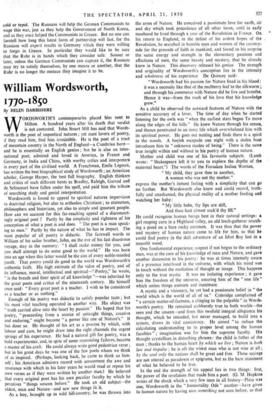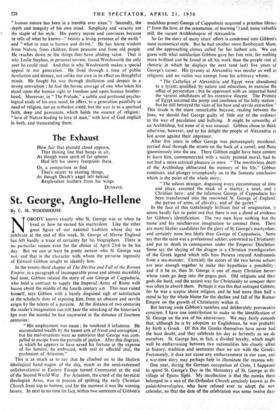William Wordsworth,
1770— I 850 By HELEN DARBISHIRE WORDSWORTH'S contemporaries placed him next to Milton. A hundred years after his death that verdict is not contested. John Stuart Mill has said that Words- worth is the poet of unpoetical natures ; yet most lovers of poetry, if they read him, find him irresistible. He is the poet of a tract of mountain country in the North of England—a Cumbrian born—
and he is essentially an- English genius ; but he is-also an inter- national poet, admired and loved in America, in France and Germany, in India and China, with worthy critics and interpreters in every part of the civilised world. A Frenchman, Emile Legouis, has written the best biographical study of Wordsworth ; an American scholar, George Harper, the best full biography. English thinkers and critics of such different bents as Bradley, Raleigh, Garrod and de Selincourt have fallen under his spell, and paid him the tribute of searching study and genial interpretation.
Wordsworth is found to appeal to spiritual natures impervious to doctrinal religion, but also to orthodox Christians ; to statesmen, philosophers and historians, yet also to simple and ignorant people. How can we account for this far-reaching appeal of a disconcert- ingly original poet ? Partly by the simplicity and rightness of his conception of what a poet is and does. " The poet is a man speak- ing to men." Partly by the nature of what he has to impart. The most popular of all poetry is didactic. The farewell words to William of his sailor brother, John, on the eve of his last disastrous voyage, stay in the memory: "I shall make money for you, and you shall attempt to do some good to the world." He was born into an age.when this latter would be the aim of every noble-minded youth. That poetry could do good to the world was Wordsworth's authentic faith. His high estimate of the value of poetry, and of its influence, moral, intellectual and spiritual—`;Poetry," he wrote, " is the breath and finer spirit of all knowledge "—was inherited by the great poets and critics of the nineteenth century. He himself once said: " Every great poet is a teacher. I wish to be considered as a teacher or as nothing."
Enough of his poetry was didactic to satisfy popular taste ; but his most vital teaching operated in another way. His object was " truth carried alive into the heart by passion." He hoped that his poetry, " proceeding from a source of untaught things, creative and enduring," might become " a power like one of Nature's." It has done so. He thought of his art as a process by which, with labour and care, he might draw into the right channels the urgent springs of his experience. He had a natural gift for poetry, was a bold experimenter, and, in spite of some resounding failures, became a master of his craft. He could always write good pedestrian verse ; but in his great days he was one of the few poets whom we think of as inspired. (Perhaps, looking back, he came to think so him- self ; his American admirers record with amusement the awe and reverence with which in his later years he would read or repeat his own verses as if they were written by another man.) He believed that every original poet has his own peculiar faculty by which he perceives " things unseen before." He took anold subject—the oldest, man and Nature—and saw new things in it.
As a boy, brought up in wild hill-country, he was thrown into
the arms of Nature. He conceived a passionate love for earth, air and sky which took precedence of all other loves; until in early manhood he lived through a year of the Revolution in France. On his return to England, in the defeat of his ardent hopes of the Revolution, he searched in humble men and women of the country- side for the grounds of faith in mankind, and found to his surprise the same energy and strength in the elementary passions and affections of men, the same beauty and mystery, that he already knew in Nature. This discovery released his genius. The strength and originality of Wordsworth's conception lies in the intensity and wholeness of his experience De Quincey said:
" Wordsworth had his passion for Nature fixed in his blood:
it was a necessity like that of the mulberry leaf to the silkworm ; and through his commerce with Nature did he live and breathe. Hence it was—from the truth of his love that his knowledge grew."
As a child he observed the outward features of Nature with the
sensitive accuracy of a lover. The time of day when he started listening for the owls was " when the earliest stars began To move along the edges of the hills." He knew Nature through his senses, and thence penetrated to an inner life which overwhelmed him with
its spiritual power. He goes out nutting and finds there is a spirit in the woods. A boyish escapade one night with a stolen boat introduces him to " unknown modes of being." There is the same true insight within and without in his poetry of human nature.
Mother and child was one of his favourite subjects. (Lamb wrote: " Shakespeare left it to you to explore the depths of the maternal heart.") The words of the Forsaken Indian Woman, " My child, they gave thee to another, A woman who was not thy mother."
express the mother's inmost feeling with a simplicity that can go no further. But Wordsworth also knew and could record, truth- fully and unashamed, the physical reality of a mother feeding and watching her baby: " My little babe, thy lips are still, And thou hast almost suck'd thy fill."
He could recognise human beings best in their natural settings: a girl reaping corn in a Highland valley, an old leech-gatherer search- ing a pond on a bare rocky common. It was thus that the power and mystery of human nature came to life for him, so that ho could find poetry in the daft adventure of an Idiot Boy lost in a moonlit wood.
One fundamental experience, suspect if not bogus to the ordinary man, was at the core of his knowledge of man and Nature, and gave another dimension to his poetry: he was at times intensely aware of a presence interfused in the universe, with which his mind was in touch without the mediation of thought or image. This happens only to the true mystic. It was no isolating expetience ; it gave him the freedom of the universe, assuring him of the " one life" which unites things animate and inanimate.
A mystic and a visionary, he yet had a passionate belief in " the world which is the world of all of us." Coleridge complained of " a certain matter-of-factness, a clinging to the palpable " in Words- worth's poetry. He remained stubbornly true to both worlds—the seen and the unseen—and from this twofold integral allegiance his thought, which he intended, but never managed, to build into a system, draws its vital consistency. He aimed " to reduce the calculating understanding to its proper level among the human faculties " ; imagination was for him the supreme faculty. His thought crystallises in disturbing phrases: the child is father of the man ; thanks to the human heart by which we live; Nature is both law and impulse ; he is oft the wisbst man who is not wise at all ; by the soul only the nations shall be great and free. These sayings are not uttered as paradoxes or epigrams, but as the bare statement of what he believed to be true.
In the end the strength of his appeal lies in two things: first, the power of the revelation that made him a poet. (G. M. Hopkins writes of the shock which a very few men in all history—Plato was one, Wordsworth in the " Immortality Ode " another—have given to human nature by having seen something not seen before, so that
" human nature has been in a tremble ever since.") Secondly, the depth and integrity of his own mind. Simplicity and veracity are
• the staple of his style. His poetry moves and convinces because he tells of what he knows—" beauty a living presence of the earth " and " what in man is human and divine." He has learnt wisdom from Nature, from children, from peasants and from old people. He reaches down to the things that have abiding value. That is why Leslie Stephen, in personal sorrow, found Wordsworth the only poet he could read. And that is why Wordsworth makes a special appeal to our generation. He• lived through a time of public dereliction and dismay, not unlike our own in its effect on thoughtful minds. He fought his way through disillusion and despair to a strong conviction ; he had the heroic courage of one who takes his stand upon the human right to freedom and upon human brother- hood. Moreover, in " The Prelude," a subtle and profound psycho- logical study of his own mind, he offers, to a generation painfully in need of religion, not an orthodox creed, but the way in to a spiritual faith, deep and passionate, which holds the essence of religion : " love of Nature leading to love of man," with love of God implicit in both, and transcending them.







































 Previous page
Previous page